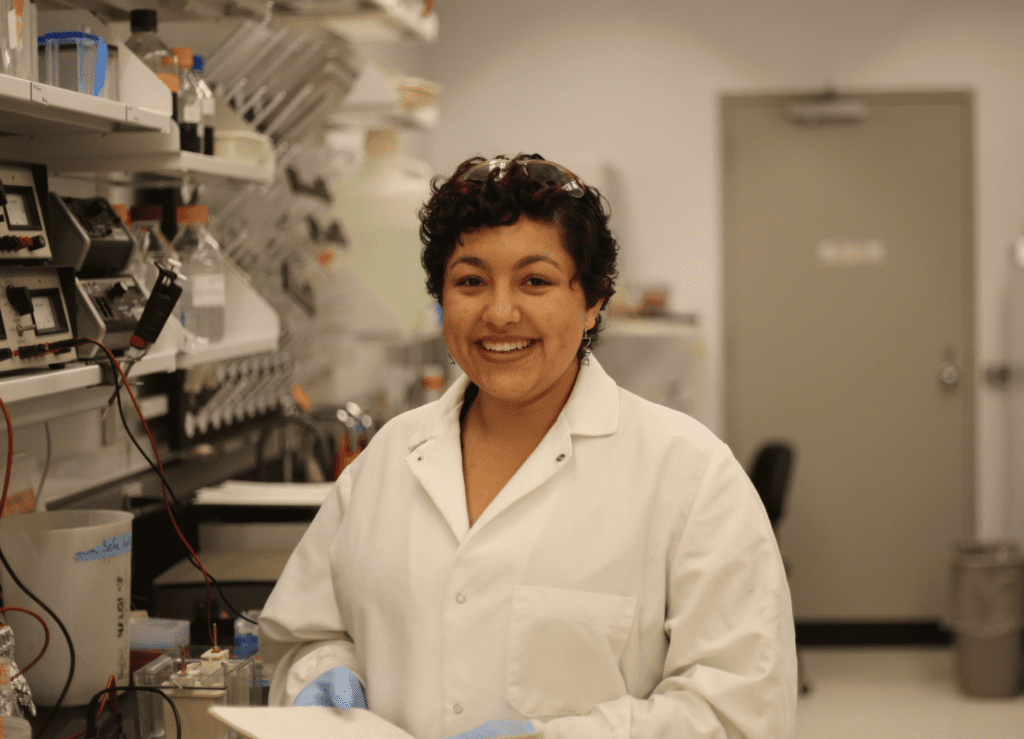News
An Interview With PGRP Intern Natalie Gonzalez
 Natalie Gonzalez, a Plant Science major at the University of California, Santa Cruz, is also a repeat Research Experiences for Undergraduates (REU) intern. Now in her third REU internship, Natalie explains how having a mentor and interning at BTI has given her a new perspective on where to plant her professional roots.
Natalie Gonzalez, a Plant Science major at the University of California, Santa Cruz, is also a repeat Research Experiences for Undergraduates (REU) intern. Now in her third REU internship, Natalie explains how having a mentor and interning at BTI has given her a new perspective on where to plant her professional roots.
What is the research project that you are working on?
I am assisting with a project being conducted by my mentor, Amber Hotto. The project involves the possible modification of the tobacco plant chloroplast genome. My main responsibilities are to carry out protein and chloroplast extractions, run polymerase chain reactions (PCRs), create western blots, and complete plant platings.
What made you interested in interning at BTI?
After completing two previous REUs, I knew that I was interested in doing plant research. I became especially interested in plant genetics when I took part in a biotechnology program at my previous community college.
A few professors who I am very close with recommended a variety of REU options and BTI really stood out to me. This internship is definitely my favorite because my aspirations in plant genetics align nicely with the work being done at BTI. I’m really enjoying the work I’m doing and the team I work with, especially my mentor.
Speaking of mentors, describe the experience you’ve had so far with your mentor. How has having a mentor been a benefit?
Amber has been great and I am very lucky that I was able to join her lab. She’s in the lab with me every day and we work together very closely. I don’t think there’s been a single day I’ve worked without her. Over time, I’ve been able to work more independently, but Amber is always welcoming when I do come to her with questions. We also have a lot of similar interests: most importantly, we’re both foodies!
What has been the most interesting or exciting part of your internship?
I’ve really enjoying the opportunity to carry out every part of the project process by myself. At school, many of the tests and experiments I’ve done in class have been pre-made. I hadn’t had the opportunity to experience complete first-hand research until I came to BTI. I’ve also learned many new techniques along the way, such as how to work with X–ray film and run PCR reactions for the first time.
What challenges have you faced, and how did you overcome them?
There’s a big difference between what you’re taught in the classroom versus what you actually do in the lab. I’ve had to learn a lot of new “lingo” and terminology that I once had never heard of. I also had to learn to work with equipment that I didn’t know existed. It was difficult in the beginning, but I was never afraid to ask questions and was able to learn through experience.
Overall, what are the benefits you will take away from your experience at BTI?
Before coming to BTI, I was convinced that my professional goal was to work in plant genetics to develop drought-tolerant crops. My initial thinking was “I’m going to make drought-tolerant crops someday!” Now, my thinking is “I’m going to make the tools so that others can develop drought-tolerant crops someday.”
After learning more about basic research, I realized that there is still room for improvement in gene editing tools. It made me think about possible ways to improve tools and protocols. If I could work to make these resources, I could help researchers accomplish more research in a variety of fields. The effect of my future work could be so much more impactful that way, and I wouldn’t have come to this decision if I hadn’t interned at BTI.
Natalie will be presenting her research at BTI’s annual PGRP Summer Symposium on August 10th, 2017. Click here for the official symposium live-streaming page.


